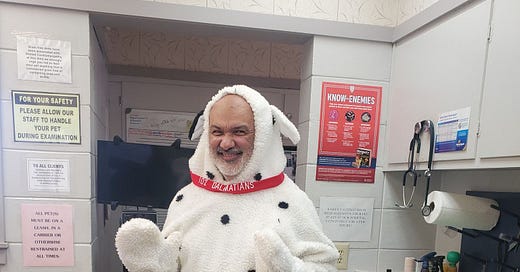The Weird Veterinarian
We need to be the voice and standing up for those who have a difficult time doing so by themselves.
Embracing Neurodiversity in the Veterinary Profession
Neurodiversity encompasses the natural variations in human neurological functioning, emphasizing accepting and celebrating cognitive, sensory, and motor differences. In the veterinary profession, understanding neurodiversity is crucial for fostering an inclusive and supportive workplace culture that benefits both neurodiverse individuals and the field.
Photographer: Bremen Animal Hospital
Understanding Neurodiversity
Neurodiversity encompasses conditions such as Autism Spectrum Disorder (ASD), Attention Deficit Hyperactivity Disorder (ADHD), Dyslexia, Tourette Syndrome, and Sensory Processing Disorder (SPD). Each condition brings unique characteristics and challenges. Therefore, it is essential to recognize that neurodiversity is a spectrum, with individuals exhibiting distinct strengths and challenges.
Challenges Faced by Neurodiverse Veterinarians
Neurodiverse veterinarians may encounter various challenges in their work. For instance, individuals with ASD or ADHD might struggle with social interactions, making building relationships with clients or colleagues difficult. Likewise, those with SPD may face sensory overload in a clinical setting. Additionally, communication can be challenging for individuals with conditions like dyslexia or Tourette syndrome, affecting their reading, writing, or speaking abilities.
Overcoming Stereotypes and Discrimination
Neurodiverse veterinarians may face stereotypes or assumptions hindering their professional success. Misconceptions like poor teamwork or communication skills can lead to discrimination or exclusion. It is essential to dispel these stereotypes and promote an inclusive culture that values the unique strengths and perspectives of neurodiverse individuals.
Benefits of Embracing Neurodiversity
Embracing neurodiversity in the veterinary profession yields numerous benefits. Neurodiverse individuals bring exceptional skills and perspectives, including animal behavior and training expertise, attention to detail, and creative problem-solving abilities. By valuing and supporting neurodiversity, veterinary clinics can create a more diverse workforce, foster innovation, and better meet the needs of clients and patients.
Creating an Inclusive Workplace Culture
To cultivate an inclusive workplace culture, veterinary clinics can take specific steps:
Training and education on neurodiversity can increase staff understanding and support for individuals with diverse needs.
Making accommodations, like quiet spaces for sensory issues or alternative communication methods, is crucial.
Eliminating stigma and discrimination through acceptance and understanding helps create a welcoming environment.
No Weird But Unique!
Embracing neurodiversity in the veterinary profession is vital for creating a diverse, innovative, and inclusive environment. By recognizing the unique strengths and perspectives of neurodiverse individuals, veterinary clinics can attract talent from diverse backgrounds and enhance overall patient care. In addition, valuing and supporting neurodiversity fosters a workplace culture that benefits both neurodiverse individuals and the veterinary profession.
Meet Fox: "Two decades ago, I was diagnosed with moderate autism spectrum disorder, and physicians were unsure whether I could live independently. I was nonverbal until I was four, went to four different elementary schools, two different middle schools, and received a decade of therapy. I was recently accepted to the Philadelphia College of Osteopathic Medicine's Doctor of Osteopathic Medicine program!"





I love this article!